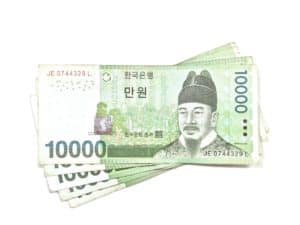 97% of Korea’s 200 cryptocurrency exchanges are at risk of bankruptcy as low volume and tightening regulations temper what was once one of the world’s busiest crypto-trading markets, Business Korea (BK) reports.
97% of Korea’s 200 cryptocurrency exchanges are at risk of bankruptcy as low volume and tightening regulations temper what was once one of the world’s busiest crypto-trading markets, Business Korea (BK) reports.
Local exchange revenues are also being diminished as Korean crypto-coin projects increasingly seek to be listed on foreign trading platforms.
Besides collecting fees for trading and transferring money, many crypto exchanges also charge fees to list coins. These fees have sometimes been substantial.
Last August, the creator of a crypto project called Expanse claimed on Twitter that Binance, one of the world’s leading crypto-trading platforms, tried to charge him 400 Bitcoins (worth $2.5 million USD at the time) to list his coin.
Binance CEO, Changpeng Zhao, denied the allegation.
Meanwhile, platforms like Binance (started in China, now headquartered in Malta) and BW.com (based in China), BK claims, have been happily listing Korean ICO (initial coin offering) projects, and, “Leading global foreign exchanges are scrambling to open the Korean won market to enter the domestic market.”
Korean ICOs Medibloc and Temco are now seeking foreign exchanges listings, and BW.com, which is, “planning to absorb domestic cryptocurrency investors by opening the won market by the end of this month,” has reportedly agreed to list the Korean ICOs Ziktalk, Storichain, Payexpress and Sigma Chain.
In late 2017, when Bitcoin hit an all-time high price of $20 000 USD, crypto markets in Korea were so hot that local traders were paying a “kimchi premium” of up to 40% to obtain the coin.
This premium made the price crash of 2018 even more painful for any Koreans who may have bought bitcoins at top of market. When the halcyon haze of 2017 cleared, investment-scam scandal upon scandal rocked the Korean crypto world and regulators seemed, for the first time, to apprehend the risks and start to act.
BK says an end to the domestic free-for-all is now pushing many ICO projects to seek their fortunes offshore:
“Experts point out that domestic blockchain projects are flocking to foreign exchanges largely due to tougher domestic cryptocurrency exchange market conditions. Investors cannot make or withdraw deposits in the Korean currency at Korean exchanges. Excluding the nation’s four largest exchanges, some 200 smaller exchanges cannot open real-name virtual accounts. This is one reason cryptocurrency investors cannot benefit from investor protection.”
 In addition to widespread exit-scamming and wash-trading on Korean exchanges, in 2018, evidence emerged that several multi-million-dollar robberies on Japanese and Korean crypto exchanges may have been executed by North Korean state-sponsored hackers.
In addition to widespread exit-scamming and wash-trading on Korean exchanges, in 2018, evidence emerged that several multi-million-dollar robberies on Japanese and Korean crypto exchanges may have been executed by North Korean state-sponsored hackers.
Whether by account restrictions or diminished appetite, activity on Korean exchanges is down:
“A low transaction volume is another reason Korean blockchain startups avoid listing on domestic exchanges. Only five or six South Korean exchanges rank among the top 100 in the world in terms of transaction volume.”
Exchanges that flourished in the boom now gaze at the abyss, BK writes:
“It is no exaggeration to say that 97 percent of domestic exchanges are in danger of going bankrupt due to their low volume of transactions.”

